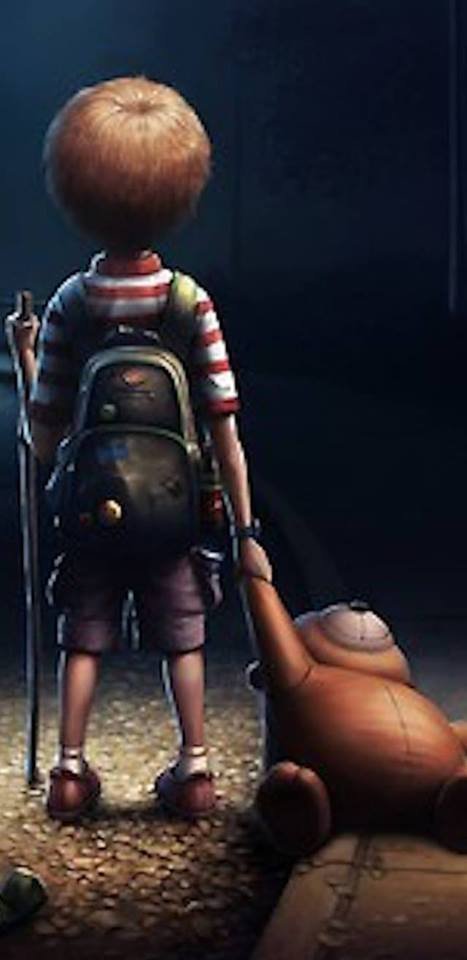
Many times we notice that a child's normal behavior is disturbing others around their birth. In other words, when the little one does what he wants and what he feels, the people around him, most often his parents, are unhappy with what he does. So the little one makes his own conclusions - to be yourself is a bad thing, since it disturbs those around you. Such a discovery is not a pleasant one, say psychologists. This is how people's complexes are formed. While, if a child is allowed to behave as he wishes, he will always behave normally without making scenes of crisis.
In the opinion of psychologists, most children go through the next four stages when they are not allowed to behave like this: Knowing the happiness of behaving in the way he feels, to be self-sacrifice because he can not be himself the crisis period, manifested by protest. To avoid suffering, the child resembles the situation and begins to behave like a new man , which does exactly what the mature ones want from him.
Specialists say that some people remain stuck in the third stage and always, almost all of their lives, are unhappy, upset, and face behavioral crises. In most cases, however, during the third and fourth stages people create masks, some masks to protect them from the pain suffered at the second stage. Such masks are five, which correspond to the main psychological traumas suffered by the human being.
Trauma - the masks Rejected - Left - dependent Mild - masochist (who loves to keep everything under his control) Whoever was betrayed - the one who loves to control everything Who has been wronged - the one who imposes its most severe limits.
The fugitive complex appears when the child rejects a parent, the little girl rejects my mother, and the little boy dad. Later, such a person is alternately inclined to act as a person who has been dismissed or deserted, and subsequently also intentionally creating such situations. The fugitive seeks loneliness, intimacy, because he fears the attention of others because he does not know how to behave in such situations. It seems to him that his existence is too important. The fugitive does not believe in him and thinks he is not good for anything. And for this reason, he uses every means to grow in the eyes of others, but also in his eyes.
Complexul celui părăsit apare atunci când copilul nu este acceptat de un părinte - în cazul fetiței este vorba de tata, iar în cazul băiatului este vorba de mama. Aceste persoane mereu au o foame emoțională. Dependentul poată părea leneș, din motiv că nu-i place să fie activă sau să lucreze singur. El mereu are nevoie de prezența cuiva, care să-i ofere măcar sprijin moral. Dacă el face ceva pentru alții, se așteaptă ca afecțiunea să fie reciprocă. Dependentul poată să o facă pe jertfa deseori, pentru a atrage atenția asupra sa. El mereu crede că i se acordă prea puțină atenție. Când el încearcă toate metodele pentru a atrage atenție, de fapt, el este în căutarea oportunității de a se simți suficient de important pentru a obține sprijin. El simte că, dacă nu a reușit să atragă atenția unui oarecare om, înseamnă că nici nu va putea conta pe el.
The complex of the humiliated is formed when the child feels that one of the parents is ashamed of him or fears the child will be ashamed. Humiliation only intensifies when parents, for example, try to explain to some guests why the child behaves like this. The humiliated person wants to prove that he can be a trustworthy and solidary man, so he often assumes to do much more than he should. Helping others, he tries to convince himself that he has nothing to be ashamed of. Another part of the coin in this situation is that the humble begins to feel even more humiliated when he realizes that he was used by someone. He will always say that his work is not appreciated to the right value.
The complex of the betrayed - can occur when the child feels he was betrayed by a parent - the daddy and the mother boy. This happens when the parent does not respect the promise or takes advantage of the child's naivety. From this he begins to keep everything under control, to convince himself that he has achieved all the goals he has set - to keep one's trust in him, to be responsible. At the same time, ask this from others. Because such people would face a very difficult bet, they try to be at the highest level to avoid betrayal. They do everything in their power to be responsible, strong, distinguished, important people.
Complexul celui nedreptățit apare atunci când copilul se simte nedreptățit pentru faptul că nu se poate dezvolta așa cum își dorește, că nu poate fi el însuși. El trece prin această traumă, învinuind în acest sens pe unul din părinți - fetița o învinuește pe mama, iar băăiatul pe tata. El simte răceală din partea acestui părinte, mai exact din cauza incapacității acestuia de a se exprima așa cum vrea el. Asta este ceia ce simte copilul, nu neapărat părintele este văzut și de alții în acest fel. Copilul, în astfel de cazuri, mai mereu suferă atunci când părintele îi face remarce cu privire la ceva. Rigiditatea în comportament începe să o capete atunci când încearcă să fie corect prin tot ceia ce face. În acest mod, el crede că dacă tot ceia ce face și spune el este perfect, atunci așa și este corect, așa și trebuie să fie. El crede că dacă încearcă să acționeză fără intenții rele, asta neapărat înseamnă că el a acționat corect.
Ways to heal traumas from childhood
The trauma of the rejected person begins to be treated when this person begins to affirm. And even if someone does not notice him and does not know him, this does not bother him anymore. The trauma of the destitute is near healing when man begins to feel good in solitude and when he feels he does not need much attention. Life is no longer so dramatic. More and more often there is a desire to develop different projects. And even if no one offers to help him, he is eager to do it alone.
Humiliated trauma begins to be treated when the person is no longer a volcano of emotions when someone says or does what he does not like. He begins to no longer be so affected by the outcome and discovers the desire that all things go according to his plan. He no longer wants to be the center of "gravity." He enjoys any result, even though in some cases his work has not been appreciated as he wished.
The injustice of the wrongdoer begins to be treated when man no longer puts so much effort into being perfect. He admits mistakes and does not mind this, always criticizing himself, as he did before.
Psychologists say that the treatment of child psychological trauma is very important. That's to put the energy people put on to create certain masks to defend them from pain, free themselves and be directed to carry out other, more important, actions. That is, living that life in which the person dreams, remaining alone.
Posted from my blog with SteemPress : http://laviniaterapeut.org/uncategorized/types-of-children-%f0%9f%91%a6/
